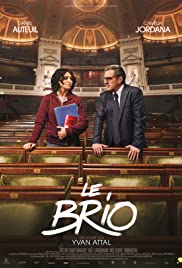
LE BRIO
France, 2017, 95 minutes, Colour.
Daniel Auteuil, Camelia Jordana, Yasin Houicha, Nozha Khouadra, Nicholas Vaude, Jean- Baptiste Lafarge.
Directed by Yvan Attal.
A very strong French drama, principally in its interaction between its two central characters, a rather smug and obnoxious academic, played by Daniel Auteuil, and a young law student, Camelia Jordana, whom he challenges and insults publicly during a lecture. He is asked by the President of the University to take on the student and train her to participate in a public speaking competition so that he avoids being stood down from the University because of his behaviour.
The film does not give much background to the Professor except for a visit to his senile and angry mother. However, it fills in the background of the young woman, her mother and grandmother, living in a poorer suburb of Paris, her friends from the past, especially one with whom she is in love.
The bulk of the film shows the sessions between the academic and the young woman, the nature of the training, her becoming more articulate, learning of the different ways to manage debating, her eventually becoming more expert, even with an episode in the metro where she has to declaim Shakespeare’s Julius Caesar to the passengers. In her first stage, she loses her calmness when she is insulted by her opponent. However, she gains control, goes into various rounds of the debate and wins them. But, at the time of the final, she discovers that the academic is on probation for his position and she declares that she is unwilling to be a foil for him. However, her boyfriend provides common sense, challenges her and she goes to the board meeting, is able to use all her acquired talent for debate and argument, for and against him. He follows her and is grateful.
The prologue of the film is a series of interviews with authors with views on the relationship between words and objects. The film is very strong on the nature, articulation and delivery of words.
And, while there seems happy ending, there is a fine postscript where the young woman interviews an insolent young man whom she is about to defend in court – and her strong demands on him, her self-confidence for her future.
1. The title? Contest and upset?
2. A French production, the city, trains, the streets, the atmosphere of Paris? The University, the interiors? The poorer suburbs, homes? Cross-section of Paris? The visits to the cities? The musical score?
3. The introduction, the interviews with celebrated writers, the comments on words, ideas – and how this continued throughout the film, the value of words, articulation, pronunciation, clarity? In speechmaking? In debate? The listing of the principles for debate, for meaning, for persuasion? Not necessarily for expressing the truth?
4. The introduction to Neila, on the train, the music, being late, at the University, Pierre confronting her publicly in front of the class, the interactions, insults, racist innuendo, the reaction of the class? Its being videoed? Pierre called before the President of the University? His being on trial? The president announcing the speech competition? His suggesting that Pierre train Neila as part of his redemption and not losing his job?
5. Neila, her background, her mother, scenes at home, her grandmother, traditional dress, the meals, criticising her daughter for not marrying? The young people, Neila and her friendship, knowing Mounir for so long, taunting him, loving him, the night together, his criticisms of her, her changing? And finally reunited?
6. Neila, studying law, her ambitions, her reaction Pierre’s attack, her return, the appointment in the classroom, the initial interactions, hostility, the development over the weeks, his aim for her to win the competition?
7. The detail of the sessions, clarity of speech, on the desk, declaiming, slowing down in delivery? On the train, declaiming Shakespeare, the reactions? Pierre and his speech, getting the tip from the old lady? The reaction of people on the train, that she sounded like Lord of the Rings? The musicians?
8. Debate techniques, the various rules and strategies, her illustrating each of them, from tentative to definite?
9. The visit to the home for the elderly, Pierre’s cranky mother?
10. The first debate, clothes making the man…? Her opponent, well-dressed, slick, his speech, his taunts? Her speech, insulted, attacking him, the poor speech, Pierre’s reaction?
11. The development, the training, the further debates, the continued success? Victories?
12. Benjamin, her disdain, talking with him, his own career, his revealing the situation about the president getting Pierre to redeem himself by working with her?
13. The staying at home, not wanting to help him? The discussion with Mounir, his making her see sense about what she had done, the futility of giving up? Her arrival, everybody gone? Going to the board meeting, insisting on speaking, using all the techniques of her training to explain Pierre, praising him, criticising him, persuading the board? His following
her, his gratitude?
14. The postscript to the film, as a lawyer, the interview with the young man, his surly reactions, her standing her ground, insisting? Her sense of achievement – and her future?